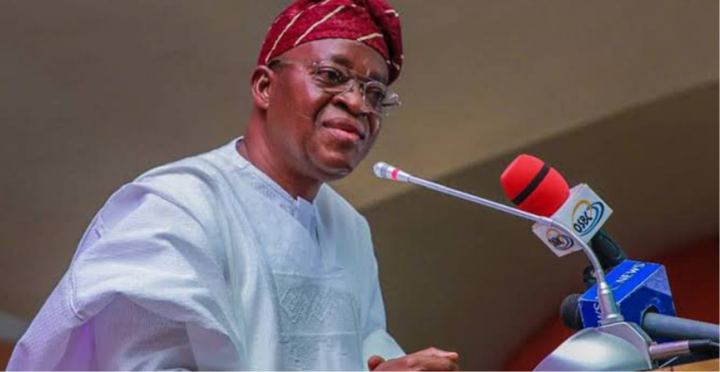Nigeria’s Minister of Marine and Blue Economy, Adegboyega Oyetola, has reaffirmed the Federal Government’s commitment to ending the nation’s reliance on fish importation, pledging to boost local production and create a sustainable aquatic economy. The minister made this declaration during a recent stakeholder engagement in Lagos, where he outlined plans to transform Nigeria into a self-sufficient and export-driven hub in the fisheries sector.
Oyetola emphasized that the current dependence on fish imports, which cost the country billions of naira annually, is unsustainable for a nation blessed with vast marine resources. He explained that the Federal Government is developing a comprehensive framework to increase local fish production through investment in aquaculture, regulation of the fishing industry, and empowerment of local fish farmers.

“Fish importation is a major contributor to Nigeria’s foreign exchange pressure, and it is unacceptable that we continue to import what we can produce locally,” Oyetola stated. “Our goal is to build a sustainable fisheries ecosystem that will not only meet local demand but also position Nigeria as a major player in the global fish market.”
He revealed that the ministry, in collaboration with relevant agencies such as the Nigerian Institute for Oceanography and Marine Research (NIOMR), is working to strengthen the aquaculture value chain. The focus, he said, includes enhancing hatchery operations, supporting smallholder fish farmers, modernizing fishing equipment, and improving processing and preservation techniques.
Oyetola further disclosed that the government plans to introduce new policies aimed at curbing illegal fishing activities and promoting responsible fishing practices. According to him, the ministry will work closely with the private sector, research institutions, and international development partners to achieve the desired transformation.
Nigeria currently consumes over 3.6 million metric tonnes of fish annually, while local production accounts for less than half of that figure. The shortfall has forced the country to rely heavily on imports to meet demand, leading to an annual foreign exchange outflow estimated at over $1.2 billion. Oyetola described this as “a drain on the nation’s economy that must be addressed through strategic intervention.”
He added that efforts are underway to upgrade local fish farms and coastal communities with modern technologies to boost productivity. “We are supporting fish farmers with training, funding, and access to quality feeds and fingerlings. We also plan to strengthen monitoring and data systems to ensure that local production figures are accurately captured and improved upon,” he said.
The minister reiterated that the marine and blue economy sector holds immense potential for wealth creation, employment, and export diversification. According to him, developing Nigeria’s fisheries and aquaculture industries could create millions of jobs, particularly for youths and women, while reducing poverty in coastal and rural areas.
“By fully harnessing our blue economy potential, we can unlock new revenue streams for the country. This administration under President Bola Tinubu is committed to achieving food security and economic diversification through the sustainable use of our marine resources,” Oyetola noted.
He also revealed plans to revamp existing fishery research institutions and promote collaboration between academia and industry players. The initiative, he said, would help address issues such as disease control, feed formulation, and breeding techniques to improve yields and sustainability.
Industry stakeholders at the meeting praised the minister’s vision, describing it as a timely intervention that could change the trajectory of Nigeria’s fish industry. The President of the Catfish Farmers Association of Nigeria (CAFAN), Mr. Rotimi Akintola, lauded the government’s renewed commitment, stating that with the right support and investment, Nigeria could achieve self-sufficiency in fish production within a few years.
Akintola emphasized the need for better access to credit, stable power supply, and modern infrastructure to support fish farming. “Our members are ready to scale up production, but we need consistent government support, especially in the areas of finance, cold storage, and market access,” he said.
Similarly, maritime economist Dr. Ifeoma Oguejiofor highlighted that reducing fish importation would not only conserve foreign exchange but also strengthen food security and promote local content in the marine sector. She urged the government to ensure transparency in implementing the proposed policies and to involve fishers and aquaculture entrepreneurs in decision-making processes.
Oyetola assured stakeholders that his ministry is determined to address the challenges facing the sector through collaboration, innovation, and accountability. He also noted that the government would explore partnerships with development banks and private investors to finance large-scale aquaculture projects and establish fish processing zones across coastal states.
He said: “Our vision is clear — to make Nigeria a net exporter of fish and fish products. We have the resources, the talent, and the market potential to achieve this. What we need now is to work together, maintain focus, and ensure effective implementation.”
Analysts believe that if the minister’s plans are effectively implemented, Nigeria could reduce its fish import bill by more than 60 percent within the next five years. The success of the initiative, they noted, would depend on consistent policy execution, investment in infrastructure, and strong regulatory oversight to prevent smuggling and overfishing.
In conclusion, Oyetola’s pledge marks a defining moment for Nigeria’s blue economy ambitions. By prioritizing local fish production and sustainability, the government aims not only to cut import dependence but also to create jobs, strengthen rural livelihoods, and position Nigeria as a key player in the global seafood market.
Support InfoStride News' Credible Journalism: Only credible journalism can guarantee a fair, accountable and transparent society, including democracy and government. It involves a lot of efforts and money. We need your support. Click here to Donate
